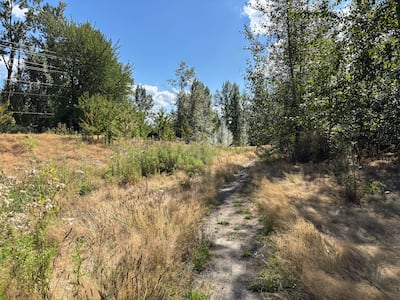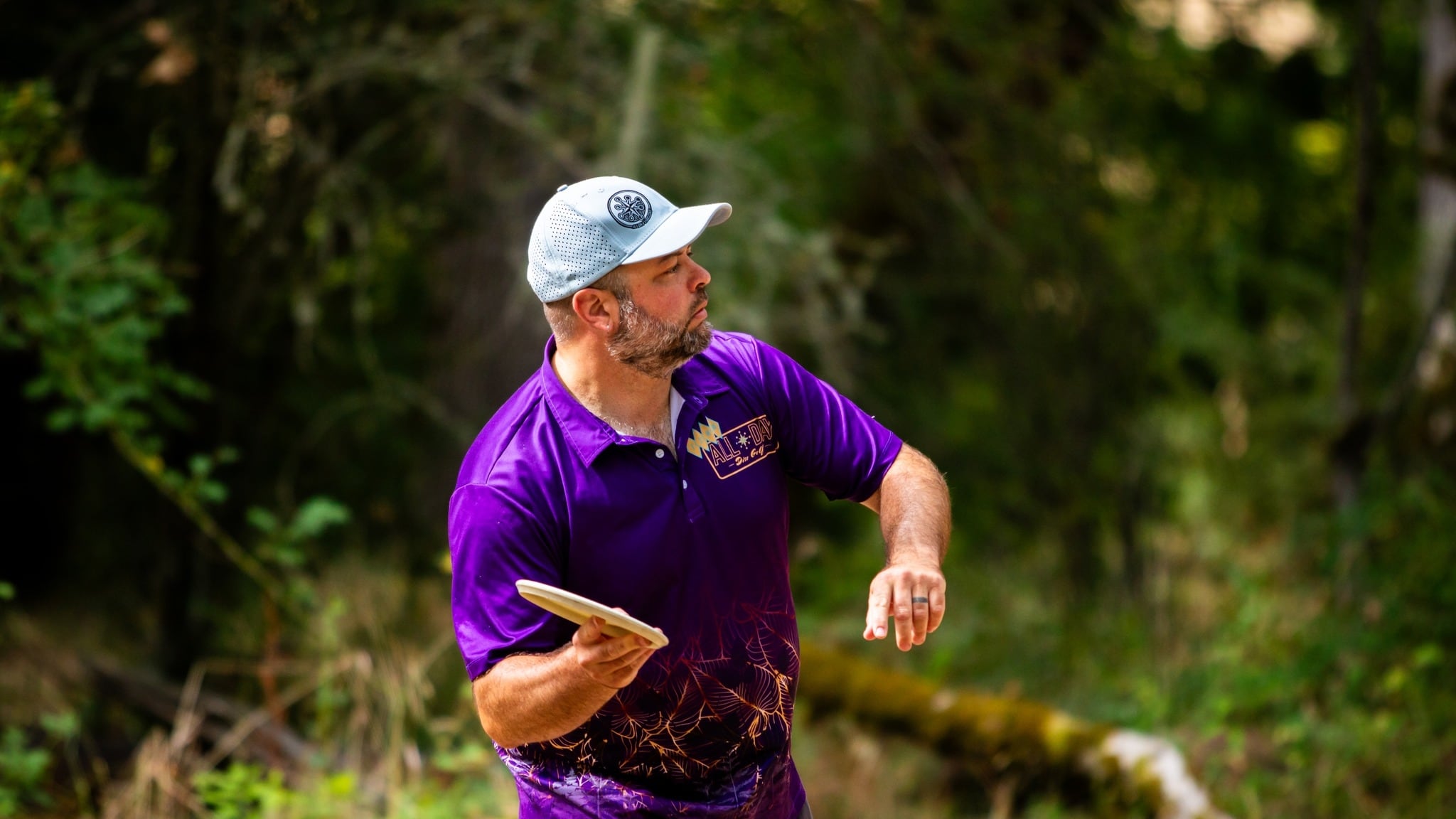The Colwood Natural Area is hard to find, nestled in the trees beyond the Colwood Golf Center in Cully. Concrete blocks along Northeast Alderwood Road make sure there’s nowhere convenient to park—and deter the homeless camps that have been a problem on this patch of undeveloped land. The 37 acres are overgrown with tall grass; jammy-smelling blackberry bushes border the Columbia Slough.
But when Jesse Tomaino surveys Colwood, he sees the future of disc golf in Portland.
Tomaino owns All Day Disc Golf, a retail store on Northwest Naito Parkway. He and his wife, Madison, fell for the sport, hard, in 2011. Madison Tomaino plays on the pro tour about half the season, and Jesse is vice president of Stumptown Disc Golf Club.
One big problem: The only disc golf course available within city limits is Pier Park in St. Johns. The 18-hole course is overrun by players. Pier Park is the third-most-popular disc golf course in the country, according to disc golf app UDisc, with 27,050 rounds scored on the app there in 2023. Experienced players know not to arrive after about 9 am on a nice day or they risk spending 20 minutes in line at the first tee.

“The big issue in our community is trying to convince [Portland] Parks & Rec for more space for a course,” Tomaino says. “Stumptown Disc Golf has the labor and funds. We just need permission, and have been rebuffed so far.”
The sport is played with Frisbee-like discs. Players start at a tee pad and make their way to the target, which is a basket with chains that you try to land your disc in with as few throws as possible. As in traditional golf, holes are designated as par 3s, 4s or 5s. To set up a new course costs $12,000 to $15,000— which the club has raised, Tomaino says—including baskets, tee pads and signage.
In 2022, Tomaino started trying to convince the city, which owns the Colwood property, that it would be a great site for disc golf. His first move was to host a cleanup day. Stumptown Disc Golf Club collected and removed 40 bags of garbage from the area. He also gathered 1,159 signatures on a Change.org petition in February 2024 to strengthen his case to the city.
“We wanted to show the city that we would be good stewards of the land, which had campers and rusted-out RVs on a once-beautiful piece of property,” Tomaino says.
Disc golf is one of the fastest-growing sports in the world, he adds, and our state is a hub. Oregon will host the 2027 Professional World Champion competition at Milo McIver State Park in Estacada and Glendoveer Golf Course in East Portland. (Glendoveer’s disc golf course is playable only once a month, and for tournaments.) Portland’s dearth of disc golf courses sets it apart. Tomaino has surveyed other midsize American cities to compare their disc golf course offerings. Charlotte, N.C., has 19 courses. Albuquerque, N.M., has nine. Sacramento, Calif., and Baltimore each have seven.
Portland Parks & Recreation has been remarkably difficult to pin down as to why the disc golf course project is a nonstarter, citing everything from funding to staffing to lack of diversity as excuses. In 2023, the parks bureau conducted a citywide study to identify potential locations for a new disc golf course, at the urging of Tomaino and other community members. After screening 318 parks, natural areas and golf courses, the bureau also identified Colwood Natural Area as a strong possibility, along with Clatsop Butte Park on Southeast 152nd Avenue. (Stumptown would be good with either of those options, and has also eyed a spot in Washington Park that would work.)
According to parks spokesman Mark Ross, the city-edge locations align with PP&R’s strong focus on equity and prioritizing park investments that serve Portland’s diverse populations, particularly Black, Indigenous, immigrant and refugee communities. Since there is a higher percentage of these groups in East Portland, that’s where the parks bureau intends to establish a disc golf course, Ross tells WW.
But the diversity piece also appears to be working against the disc golf community. In a March 2024 email to Tomaino, Ross wrote:
“In the national data we’ve looked at, it shows that disc golf is not a particularly diverse user group (it tends to be mostly white and male in terms of who plays). If you have better information on the demographics of Portland disc golf users, please feel free to share it with us. Despite this potential issue, we do know there is sufficient demand for another course, and that another course would also relieve pressure at our course at Pier Park, which is quite popular, as you noted.”
Ashley Kikukawa, a board member for the nonprofit arm of Stumptown Disc Golf, agrees with the characterization of typical disc golfers as white and male, though she is neither and is a pro in the sport. Kikukawa, who is mixed race, says she’d love to see more players who look like her out on the greens. Her dream is to have a disc golf course in each quadrant of the city.
“Wouldn’t it encourage more diverse participation if it was more accessible?” Kikukawa asks.
She brings up basketball as an analogy. The sport requires minimal equipment and can be played solo or with a friend, just like disc golf. “Why is basketball so diverse? Because there are basketball courts everywhere, in every city.”
Still, no new disc golf course is in the works to relieve the overcrowding at Pier.
The city has also looked at the possibility of installing a nine-hole “starter” course at John Luby Park in East Portland. That project is postponed “in response to staff capacity,” says the PP&R website. The parks bureau narrowly escaped a $7 million cut to outdoor parks maintenance in Mayor Keith Wilson’s recent city budget. But the bureau has struggled financially for years, memorably in 2019 when it had to close some community centers due to a $6 million shortfall. The Parks Levy is up for renewal on the Nov. 4 ballot, which would raise approximately $91 million a year for the parks bureau for five years. If it fails, the parks operating budget would be reduced by approximately half, resulting in fewer programs and services.
When it comes to Colwood, John Luby or Clatsop Butte parks, it’s no dice—or discs—for now.
“At this time, none of these options have funding for design, development, or long-term maintenance,” Ross wrote in an email to WW. “When resources become available, PP&R is committed to engaging the community, including disc golf players, to shape how these spaces could be used and what amenities would best serve Portlanders.”
Tomaino says he’s not giving up on Portland, but has decided to focus his energy on the ’burbs. He helped Wilsonville expand its nine-hole course at Memorial Park into a full 18, and he’s talking to the Tualatin Hills Park & Recreation District and Beaverton about adding more disc golf infrastructure.
“They have the space and are easier to work with,” Tomaino says. “Unfortunately, Portland has stonewalled us to the point that I don’t know what else we can say to them.”

